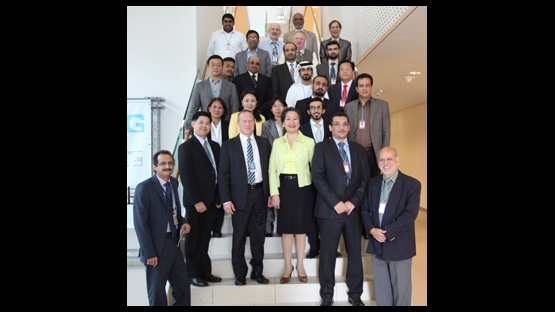Under IAEA technical cooperation (TC) project RAS/9/068, "Strengthening and Harmonizing National Capabilities for Response to Nuclear and Radiological Emergencies," efforts have been invested to strengthen the related capabilities in the region through on-the-job fellowships, scientific visits and regional group activities.
With support from the European Union (EU), it was possible to organize two regional events in the second quarter of 2014 to support the participating Member States of the project in achieving a higher degree of compliance with the requirements of the IAEA Safety Standards (GS-R-2) in the area of emergency preparedness and response (EPR).
A Regional Training Course on Basic Elements of Nuclear and Radiological Emergency Preparedness and Response was held in the Vienna International Centre in April 2014. Twenty-three participants from 16 Member States of the Asia and the Pacific Region were provided the basic, or the most important, information and tools to assist them in developing national EPR plans.
Presentations on various topics of EPR were delivered, such as the effects of radiation, exposure pathways and protective actions, past radiological emergencies, international response criteria. Participants were also invited to a review of the International Requirements for EPR and the Step-by-Step Approach to Developing Emergency Response Capability, Plans and Procedures for Emergency Response. With the guidance of the expert facilitators, participants underwent a table-top exercise, providing them a simulated experience in utilizing knowledge gained during the course.
The participants are now expected to be in a position to disseminate the knowledge and material they have acquired to larger audiences in their respective countries, and thereby strengthen their national EPR framework to respond to a nuclear or radiological emergency.
From 16 to 20 June 2014, a regional meeting was held in Jakarta, Indonesia with counterparts of the IAEA TC Project RAS/9/068. The aim of the meeting was to enhance the preparedness and response to radiological emergencies in Asia and the Pacific region. Nineteen participants from 14 Member States carried out a self-evaluation of their EPR status and agreed on the regional needs and priorities for establishing, strengthening and harmonizing emergency preparedness and response capabilities. The meeting also provided a forum for an exchange of experience and information and a forum to learn from each other, in order to achieve a high level of emergency preparedness.





